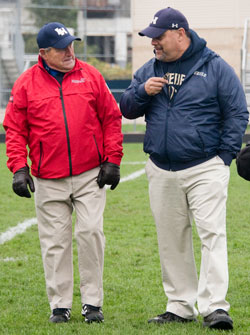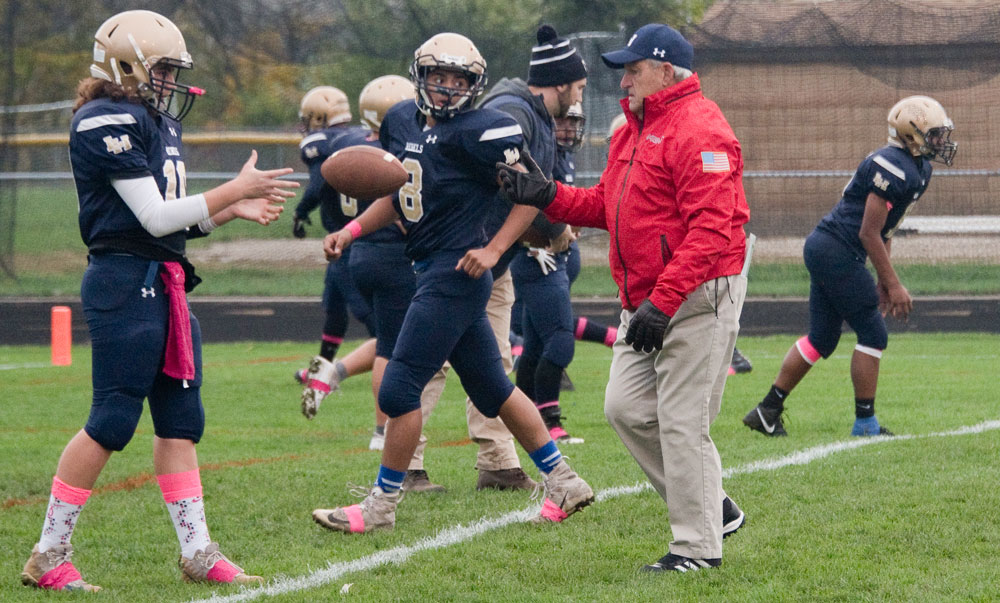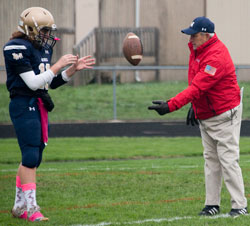Originally published December 28, 2018
Stan Jesky was at home this time last year recovering from heart surgery.
It wasn’t like Jesky, who turned 75 this Halloween, to sit still. His career spans 52 years of coaching high school sports, directing athletics for Zeeland High School, and coaching men’s varsity basketball at Kuyper College.
So when Tom DeGennaro, Lee High School’s varsity football coach, asked him to help out as an assistant at Lee, he got the OK from his cardiologist and came aboard.
It’s clear Jesky’s career has been a life influenced by playbooks. But sit down with him for a few hours, and you’ll find that his story is one for the history books.
“If you look at Stan,” said DeGennaro, a high school history teacher, “Stan is not supposed to be alive. He’s not supposed to be here. His life should’ve been stopped at 2 or 3 years old. He’s been on his own since 14. He has overcome so much.”

Overcoming the Odds
Jesky’s story starts in rural Poland.
The country fell to the Nazis in 1939. While Polish Jews make up the largest group of holocaust victims, non-Jewish Polish civilians were also targeted. According to the United States Holocaust Memorial Museum, “Nazi ideology viewed ‘Poles’ – the predominantly Roman Catholic ethnic majority – as ‘subhumans’ occupying lands vital to Germany.”
After the fall, a young Catholic couple, Stanislaw and Maria Gajewski, were split up. Maria was selected for a death camp but, knowing German, she talked her way out of it pretending to be the mistress of a German general. Each went to separate work camps
One day, Stanislaw caught a glimpse of his wife on the adjacent camp.
“Opportunist that he was, he found a way to start seeing her,” Jesky said. “That’s how I got born.”
Soon after birth, he was placed in an infant hospital.
“The Germans wanted productive people,” said Jesky. Maria could not keep him. “So I was taken and tagged, almost like a side of beef. At least they were kind enough to let the parents know where the babies were and gave them the (tag) number.”
As the Western Allies invaded Germany and bombs were falling, Jesky’s parents hopped on a bicycle and made a run for the hospital, which also had been bombed.
“There were five babies left of about 1,000 in there. I was one of the five,” Jesky said. “Dad started pedaling for Allied lines.” They were thrown by a blast, but Stanislaw caught baby Stan in mid-air, his dad would later tell him.
At age 2, Jesky was severely malnourished and still couldn’t walk. With the family farm wiped out and no records remaining, they spent the next six years at the Allied barracks. The Army was happy to have Jesky’s dad, a skilled carpenter. While in the camp, Jesky’s brother was born. The family hoped to move to America.
“There were more vaccinations than I could count. Like all refugees, you’re waiting, waiting, waiting.”

A Fresh Start
In 1951, news came that the family had been sponsored by the town of Madelia, Minnesota. Jesky remembers the passage over on the Army ship, the sea sickness, the first glimpse of the Statue of Liberty, and arriving at Ellis Island. The family took a train to St. Paul, where a man named John Clark picked them up and took them to his farm. Stanislaw worked there for a time before getting a job at Armour and moving his family to the Twin Cities, when his oldest son was 9.
At school, Jesky made a bilingual friend, Juzef, or “Joe.” Joe taught Stan, whose English was broken, how to order a slice of apple pie at the Coney Island, how to panhandle and hitchhike, and how to go to the movies.
Learning to hitchhike once landed Jesky in the backseat of a vehicle with two women who had a job for him. They took the thin, bedraggled-looking immigrant to a hotel, put him in front of national TV cameras, and had him say three words: “I like Ike.” The story they gave was that this young Polish boy had hitchhiked downtown because he believed in Eisenhower.
“I had no idea who Eisenhower was! But for five dollars, I liked Ike,” recalled Jesky.
His friend Joe also introduced him to sports. Jesky said he played on the neighborhood ballfields as often as he could. He got his name, “Stan Jesky,” when a Little League coach couldn’t pronounce his real name, Stashek Gajewski. It wasn’t until he became a citizen in 1969 (he got tired of having to go to the immigration office every January, he said) that he changed his name legally.
‘Many of our kids here come from immigrant parents or are immigrants themselves. … He beat the odds in so many ways, just like Lee kids do every day.’ — Tom DeGennaro, Lee High School football coach and history teacher
In athletics, Jesky found his place. He didn’t have the money for his own glove and at first had to use a right-handed one, though he was left-handed. “As a birthday present,” he said, “Coach bought me a left-handed glove.”
That was his first coach, Wally Wescott, who runs an antique store in St. Paul and whom Jesky still sees from time to time. Jesky’s father, who had played soccer for the Polish national team and thought it was a scam that his son was playing for free, tried to forbid it.
“He said, ‘You no play no more.’”
A plan was hatched. Wescott would come to the house looking for Stan and chat with his dad at the front door while Jesky snuck out the back door and into Wescott’s car. Jesky’s father would say he didn’t know where his son was, so Wescott would drive away. “You back there?” he’d ask the backseat. And off they’d go.

Growing up fast
When Jesky was just 13 years old, his mother died of heart failure. Maria was 42, and left behind four sons and her husband. After that, Jesky left home to stay with friends, telling his father he would be “one less mouth to feed.”
The ensuing years were tumultuous for his father, who married and divorced a woman who was taking advantage of his earnings. The three younger boys ended up in foster care.
“My dad, bless his heart, had a tough time adjusting to America,” Jesky said. “He did everything with his wife. She was his world, and I knew that.”
Jesky tears up when he talks about his mother, who taught him to make Polish minestrone, which he still makes often to share with friends.
After she died, Jesky stayed with a friend named Gary Dryling, whose dad owned a Pure Oil station and car garage. Jesky worked there on Saturdays for eight hours a day and saved enough money to buy a ‘36 Chrysler.
“I wanted a car, but I wanted a convertible. Thirty-six Chryslers weren’t convertibles,” said Jesky. “So when I bought it, Gary and I took it to the garage one Sunday, took a blowtorch and cut the top off. We made it a convertible!”

From Playing to Coaching
Jesky worked various jobs in his youth including delivering newspapers and a gig sweeping hair at Lee’s Barbershop for 50 cents an hour. He always played sports, too: football, basketball and baseball. He was going to play hockey but his knees couldn’t take the cold, the result of a bout with polio meningitis that landed him in the hospital for 11 months.
In 1958, Jesky signed a baseball contract and was put in the Atlanta Braves’ minor league system. He quickly discovered that the South was not for him, as he hates heat. He was there during the race riots.
“You have a lot of black ball players on your team, and (restaurants) wouldn’t serve them; we brought them their food on the bus,” Jesky recalled. “I could take a whole day to tell you about those experiences.”
Jesky’s teaching and coaching career took him from the Twin Cities to Florence, Wisconsin, and eventually to Zeeland in 1988, where he landed the athletic director position from which he retired. During that time, he married, started a family, earned a master’s degree in educational leadership, divorced, and married his wife Yvonne, who teaches piano.
‘The Germans wanted productive people. So I was taken and tagged, almost like a side of beef.’ — Stan Jesky, Lee High School assistant football coach
Four years ago, the couple took a trip to St. Paul, where Jesky was representing Kuyper College at a college athletics conference. He made plans to meet up with some friends at a restaurant while he was there. When they arrived, he was flabbergasted to find that the meetup was actually an induction into the St. Paul Sports Hall of Fame.

Helping Today’s Immigrants
DeGennaro says one of many reasons Jesky works so well with the Lee players is that he’s been in their shoes, and he understands some of the culture shock they face.
“Many of our kids here come from immigrant parents or are immigrants themselves. It touches home. It doesn’t matter where you immigrated from. He beat the odds in so many ways, just like Lee kids do every day.”
Jesky said he keeps in touch with many of the players who’ve played for him through the years. If you figure in all the hours coaches devote, they probably aren’t making minimum wage, Jesky said. He insists he’s not in it for the money or the glory; he’s in it for the kids.
“I grew up having mentors like that,” he said.
DeGennaro said Stan Jesky’s mentorship doesn’t stop with the players: he’s a friend and mentor to the other coaches, as well. They’ve loved drawing from his wisdom and appreciate his ability to stay positive.
“He brings 52 years of experience of coaching football — the football knowledge is there. But what Stan brings along with that is people knowledge,” DeGennaro said. “The fact that he’s lived the life that he’s lived is fascinating to me. He’s beat the odds in so many different ways.”









